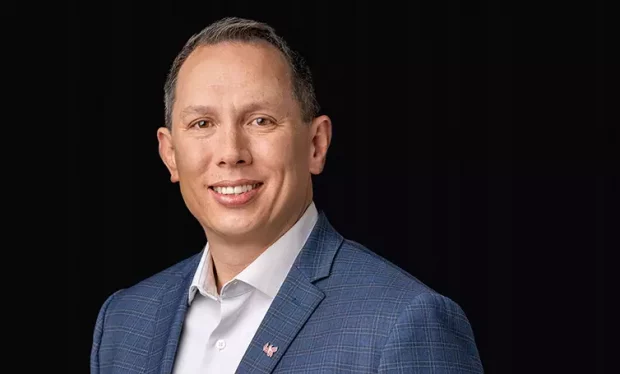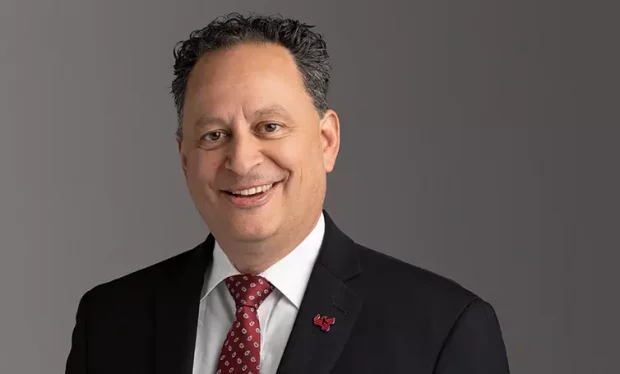President Chris Lynne and chief academic officer and provost John Woods made two things very clear Friday.
Phoenix could help convince more Idahoans to attend college.
And the $685 million purchase of the for-profit online giant carries little risk for the University of Idaho, and Idaho taxpayers.
In an extensive Idaho Education News interview, two of the University of Phoenix’s top administrators spoke optimistically about the future — and the prospective U of I purchase. They also discussed Phoenix’s troubled track record, a legacy they hope to put in the past.

“You’re gonna see a very different University of Phoenix than you read about,” Lynne said in the interview, which is available in full, in podcast format.
Here are some key topics from last week’s interview:
What does the U of I get for its money? If the deal does go through, possibly early in 2024, the for-profit Phoenix would turn over to Four Three Education, a separate nonprofit aligned with the U of I. Four Three would acquire all of Phoenix’s assets, including an online education infrastructure honed over decades.
That’s a key advantage to the acquisition, Woods said. All colleges and universities are looking for ways to provide online courses to a growing adult student population niche. It would take “decades of experience” for the U of I — or any other school — to replicate a full online system.

What are the risks to U of I? Four Three would issue bonds for the $685 million purchase. The U of I has offered to provide a backstop — up to $10 million a year, if Four Three can’t make its annual payments.
The backstop is “an absolute last resort,” said Lynne. And for several reasons.
First, the U of I might not even have to provide the guarantee, Lynne said. Four Three might be able to set up a bond sale without it.
Second, it’s unlikely Four Three would ever need help on payments. The nonprofit would have to burn through the $200 million Phoenix plans to leave on the balance sheet at the time of sale, and a $60 million to $70 million bond reserve. Phoenix is also projecting to generate $50 million in free cash flow in the first year of the sale. It would take a “catastrophic” collapse for all this money to evaporate, necessitating a U of I bailout.
“It is an extremely low likelihood, much less than 1%,” Lynne said.
The Phoenix-U of I fit. Like U of I President C. Scott Green, Phoenix’s leaders see a good fit between the online higher education giant and a 134-year-old land grant university.
And Phoenix officials believe their work on student retention — and serving older and rural students — can help Idaho address its chronically low college go-on rates.
“There is a very strong fit for us in terms of the ability to work with a state to solve those problems,” Lynne said.
Phoenix’s student profile — and recent performance. Lynne also discussed Phoenix’s student profile — which differs sharply from the U of I’s more traditional cohort of residential students. The average age of a Phoenix student is 38. About 80% of these students work, and two-thirds of Phoenix’s students have kids of their own.
How the U of I and Phoenix compare on other metrics, according to the U.S. Department of Education’s College Scorecard:
Second-year retention rate: U of I, 76%; Phoenix, 40%.
Average net price, for student receiving federal aid: U of I, $12,019; Phoenix, $13,365. (Midpoint for four-year schools: $18,902.)
Median earnings, for student receiving federal aid, 10 years after graduation: U of I, $51,325; Phoenix, $37,769. (Midpoint for four-year schools: $50,391.)
Students receiving federal loans: U of I, 44%; Phoenix, 83%.
Median total debt, after graduation: U of I, $21,982; Phoenix, $31,553.
There’s another stark difference between the two prospective partners. Only 27% of Phoenix’s students graduate within eight years, according to the U.S. Department of Education’s College Scorecard — compared to a national midpoint of 58% and the U of I’s 60% grad rate.
Still, Phoenix’s most recent academic annual report touts improvements in graduation and retention rates — a trend that has continued, Lynne said, even amidst the uncertainty of a possible sale. “Our performance has continued to improve even during this very long period of having these outside discussions.”
Secrecy and the NDAs. Many Idahoans are also uncertain about the prospective Phoenix purchase, because of the secrecy surrounding it.
U of I and State Board of Education officials spent the spring discussing the Phoenix purchase in a series of closed meetings, only going public in May, a day before the State Board signed on. At Phoenix’s insistence, U of I and State Board officials entered into non-disclosure agreements, which remain in place.
Some university employees and legislators have questioned the NDAs, with some lawmakers asking if it is even legal for a public university to make such an agreement. Lynne said Phoenix needed the agreement to protect its proprietary information, and he says his university has had to compromise as well. “It was a high level of discomfort to be as transparent as we knew we needed to be, working with a public institution.”
Is Phoenix looking at other buyers? According to public records obtained by EdNews in July, the University of Arkansas remains interested in a Phoenix purchase, even though its board of regents rejected a purchase. A third, unidentified state university system is also waiting in the wings.
If the U of I’s purchase is derailed, perhaps by an open records lawsuit filed by Attorney General Raúl Labrador, could another suitor jump in and make a deal?
Lynne downplayed this possibility. He said he has had no conversations with other would-be buyers, and Phoenix is “fully committed” to selling to the U of I. “We want this deal to happen.”
Accreditation. Two other big hurdles stand in the way of a sale — accreditors for Phoenix and the U of I must sign on.
Phoenix is hosting a site visit this week.
Phoenix received a 10-year renewal earlier this year. So while any topic could be on the table, Woods isn’t expecting another full-blown review of academics. “Really, their focus will be governance.”
A checkered past. During the interview, Lynne discussed several troubling pieces of Phoenix’s 47-year record.
Enrollment has fallen precipitously, from a 2010 peak of 475,000 to a current headcount of about 80,000. Lynne attributed the enrollment spike to a short-lived emphasis on associate’s degree programs. He said Phoenix is growing “healthily” within its current niche: adult, bachelor’s degree-seeking students.
After its boom, Phoenix also closed most of its physical campuses. But Lynne said that was a response to student demand, and a preference for online learning.
And Lynne said Phoenix decided not to fight the Federal Trade Commission, and allegations of deceptive advertising. Instead, Phoenix agreed in 2019 to a $191 million settlement, which he called a “simple business decision.”
The ads predate Phoenix’s current ownership team. “It’s not at all a reflection of the University of Phoenix that we are today.”
Reaching out to legislators. Lynne and Woods both say their private college has been focused on internal goals, as opposed to public outreach.
But that’s changing. Phoenix officials have made four recent trips to Idaho, talking about their university and the sale, and have penned a five-page open letter to legislators.
“We’re sharing our story with elected officials and leaders in the state,” Lynne said. “And it’s a great story.”
But they face a skeptical audience.
Rep. Wendy Horman was among several lawmakers who asked pointed questions during a Joint Finance-Appropriations Committee oversight hearing in June. The JFAC House co-chair says she is “impressed” with the Phoenix leadership team. But the Idaho Falls Republican still worries about the financial risk to U of I and the threat to the university’s credit rating. She also has unanswered questions about the State Board’s closed meetings, and the U of I’s plan to create a separate nonprofit to oversee Phoenix.
“I have different questions than I did in June,” she said Tuesday.
C. Scott Grow, JFAC’s Senate co-chair, also is concerned about the financial risk. And the Eagle Republican is worried about Phoenix’s reputation.
“The University of Phoenix has had their challenges along the way,” he said. “When you’re combining two different cultures, I’m not sure how all that will shake out.”
